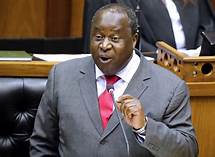News Africa
FRIDAY BRIEFING | Tito Mboweni: Has he lost his influence with Cabinet?

For a period of 13 years, we generally felt safe in the hands of Trevor Manuel, who served as finance minister under Nelson Mandela, Thabo Mbeki and Kgalema Motlanthe. It was under the presidency of Jacob Zuma that things became unsettled.
Pravin Gordhan, who took over when Manuel left, was replaced by Nhlanhla Nene during Zuma’s first term. Then, in 2015, Zuma fired Nene and brought in David van Rooyen, who literally served in the position for a few days, after Zuma had to do an about-turn following an outcry. Van Rooyen was replaced with Gordhan once more.
In 2017, Zuma once again reshuffled his Cabinet and brought in Malusi Gigaba. In 2018, it was Gigaba’s turn to be reshuffled when President Cyril Ramaphosa brought back Nhlanhla Nene. He was in the position for a short while after resigning following his testimony to the commission of inquiry into state capture, where he revealed he had met with members of the Gupta family several times between 2010 and 2014. These meetings had not been previously disclosed. In stepped Tito Mboweni, who had previously been the country’s Reserve Bank governor.
The Zuma years were one of dysfunction and is certainly reflected in the current situation we find the economy in now. It hasn’t helped that the already struggling economy has been battered by the Covid-19 pandemic, leaving Mboweni in a very challenging position. A position he doesn’t always seem keen to be in, if his tweets are anything to go by and his sojourns off to Limpopo.
As Fin24’s editor Ron Derby writes, Mboweni will always be honest to his colleagues in Cabinet about what needs to be done to get on the right track, but he currently doesn’t have a president to report to who, himself, is in a strong position. Analyst Mpumelelo Mkhabela echoes this and writes that Ramaphosa often wants to please everyone, which doesn’t assist when hard decisions need to be made.
In my interview with political economist Moeletsi Mbeki, he said that while the blame for current policies is often laid at the door of Mboweni, it is actually the ANC who should be held responsible, while Thembinkosi Gcoyi and Pearl Mncube write that Mboweni may not always get his way, but it should not be seen as Ramaphosa losing confidence in his finance minister.
Finally, economist Kenneth Creamer takes a broader look at the economy and gives suggestions for small reforms that need to happen if we want to avoid the economy continuing to contract.
Hope you enjoy the read before your weekend.
Vanessa Banton
Opinions Editor.
Source: newsreportsite.org
-

 Lifestyle1 month ago
Lifestyle1 month agoRoad Safety Authority narrates how buttocks causes road accident
-

 GENERAL NEWS1 month ago
GENERAL NEWS1 month agoWhy 15 police officers stormed Owusu Bempah’s church – Kumchacha narrates
-

 GENERAL NEWS1 month ago
GENERAL NEWS1 month agoWatch how Ibrahim Mahama rode Honda superbike to pay last respects to late friend
-

 GENERAL NEWS1 month ago
GENERAL NEWS1 month agoHow Offinso residents storm destooled queen mother’s house, demand for new chief
-

 South Africa News1 month ago
South Africa News1 month agoWoman thrown out of a speeding taxi while on her way to work
-

 GENERAL NEWS3 weeks ago
GENERAL NEWS3 weeks agoDeadly clash between youth and navy personnel results in two deaths at Tema Manhean
-

 SHOWBIZ KONKONSAH3 weeks ago
SHOWBIZ KONKONSAH3 weeks agoJunior Pope’s Death: Video of John Dumelo refusing to join canoe for movie shoot over safety concerns resurfaces
-

 News Africa2 months ago
News Africa2 months ago‘Satanically dubious’ – SCOAN releases statement on BBC’s report about TB Joshua, church





